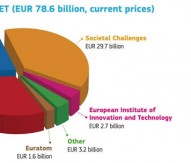

Maria Chiara Carrozza © Scuola Superiore Sant'Anna
Italy minister decides new course
Italy saw a new government take office this year following a general election in the spring. The new government, led by the centre-left Democratic Party in coalition with Silvio Berlusconi’s The People of Freedom and Civic Choice, saw Enrico Letta eventually being elected as prime minister.
The new government sees a previous rector of the Sant’Anna School of Advanced Studies, an important public university in Pisa, becoming the new Minister of Education, Universities and Research. Maria Chiara Carrozza officially took office in May 2013.
Italy was judged to be a ‘moderate innovator’ in the European Commission’s 2013 Innovation Scoreboard, scoring a success rate of 18.2% when applying for FP7 projects, below the EU average of 21%. The majority of FP7 research participation was also concentrated in specific affluent regions of Italy.
Addressing an audience at the first meeting of Italian representatives on Horizon 2020, Carrozza called for greater autonomy for researchers in Italy, and she began by outlining the importance of co-operation when considering the next research and innovation framework programme.
“It’s a very important day, a political act by the government to support research. We will be measured on the basis of the results that we achieve. The first thing I would do is thank the previous government for the commitment on this subject. Today we have the first meeting of a group that must remain strongly connected: for once Italy has to be ‘system’ and must be able to remain united. In a very complex role, we have not always been proven compact and cohesive. The Italian research, we know, is not funded as it should be.”
Collaboration
The minister outlined how there was a need for more collaboration within the Italian research community. She also highlighted the importance of working with the Italian regions in achieving this goal in order to the benefit of the country as a whole.
“These days, Italian institutions are looking in the direction of the competition. More collaboration is the answer. You have to be to take a step back. Especially in the field of private research, collaboration is essential to the development of the system and co-operation with the regions. We need to interact with regional systems, which in certain cases are very strong, thanks to their investment in research and projects. Work is needed, always in the spirit of national cohesion.”
Investment
Carrozza also highlighted the importance for further investment in research and highlighted that despite current funding levels, the results yielded did not properly reflect the financial allocation. The minister described this as “a real defeat” and therefore Italy needed “to improve in this field.”
The minister added that investment was also needed in the next genertation of researchers. She outlined one way that reasearchers could be assisted was through the relaxtion of citation restrictions.
“We must improve research in Italy. I speak especially of young researchers, to which we must give autonomy and resources. I speak also of scientific publications by young researchers: we must ensure that they are protected from the ethical point of view, to be masters of their intellectual property. This theme has been heavily damaged at European level: in Italy we cannot publish without the authority of your PhD supervisor. We are also weak because we don’t let our researchers be independent. A first response is the autonomy of young Italian researchers. Throughout 2014, we will focus on youth policy and this is our programme of government.”
The minister will hope that with changes set to be introduced, Italy will be able to benefit more from Horizon 2020.
Maria Chiara Carrozza





